Believe it or not, your dog’s digestive system harbors a veritable ecosystem of bacteria and other microorganisms!
While some of these cooties (forgive the technical language) are capable of causing stomach pain and illness, others are helpful and play a role in the digestive processes. These beneficial bacteria (called “healthy bacteria” or “probiotic bacteria” by some) perform a variety of different biochemical roles, and help to break down some of the things your dog eats.
But sometimes, this bacterial ecosystem can get knocked out of balance, and bad bacteria can begin outcompeting the good bacteria. This can reduce your dog’s ability to digest her food and result in intestinal upset.
Probiotics — commercially produced versions of beneficial bacteria — are often used to help restore balance to the intestinal flora and promote overall intestinal health.
Jump down to our favorite probiotics for dogs!
What Types of Symptoms Do Dog Probiotics Help With?

Human probiotics have been studied somewhat thoroughly among two-footers, and they have been demonstrated to provide a number of tangible benefits.
But there haven’t yet been a great deal of studies specifically examining their use in canines, but a few studies have seemed to support their use.
More research is needed before scientists and veterinarians can develop a comprehensive understanding of the way probiotics function in dogs. It is always wise to speak with your veterinarian before initiating a course of probiotics, but probiotics are largely considered safe.
Some of the things probiotics may help treat include:
- Bad Breath: Your pup’s breath is affected strongly by the microorganisms living in his digestive tract, and there’s some evidence (in humans) that probiotic therapy may alleviate the problem. So, it’s possible that probiotics will help improve your pup’s breath too.
- Diarrhea and General Intestinal Upset: Many owners and vets report that probiotics help promote healthy digestion. In fact, dog diarrhea is probably one of the most common ailments for which dog probiotics are used. Those caused by harmful bacteria are most likely to respond to the use of probiotic bacteria.
- Excessive Gas: Gas can result from a poor bacterial balance in your dog’s intestinal tract, so by providing beneficial bacteria, you may be able to alleviate problems with frequent gas.
- Low Energy: Probiotics may help improve the absorption of nutrients in the digestive tract, which can ensure that your dog has access to the calories, vitamins and minerals he needs to feel his best.
- Infections: Some probiotics are thought to potentially help support the immune system. So, they may help dogs to avoid contracting bacterial infections and fight off any that they are battling.
- Atopic Dermatitis: Some research has shown that probiotics may help control atopic dermatitis and other troubling skin conditions. So, if your canine struggles with itchy skin, you may want to ask your vet if probiotics could be helpful.
Additionally, probiotics are often used in conjunction with antibiotic regimens to help replace the beneficial bacteria some antibiotics kill. This can help alleviate antibiotic-caused diarrhea, foster healthy gut flora, and help your pooch feel better much more quickly.
It’s important to note that there’s still a lot about probiotic therapy that we don’t know.
And one of the things we don’t yet fully understand is the degree to which different bacterial and fungal strains compete with or counteract each other.
The takeaway? Long lists of probiotic strains do not necessarily equate with efficacy. Some combinations of bacteria may be very helpful, while others may prove less effective.
As always, you’ll just have to be ready to experiment while working closely with your vet.
Best Dog Probiotics: Optimal Gut Health FTW!

Today, there are many great dog foods with probiotics built into the formula. However, some dogs are picky eaters or require special diets, so pet parents can’t always take the probiotic-fortified-food approach. That’s where probiotic supplements come in handy!
Supplements like the ones listed below can be added to your dog’s dinner, packing in probiotics to make the food more tummy-friendly for your pooch.
The following 13 probiotics are all among the best, but consider the differences between them carefully before making a decision.
1. Zesty Paws Probiotic Bites
About: Zesty Paws is a six-strain probiotic that’s safe for dogs of all ages, per the manufacturer. Formed into bite-size, flavored chewables, it contains no artificial flavors, colors, or preservatives.
A US-made probiotic chewable containing a balanced blend of 6 belly-boosting strains.
Features:
- Provides 3 billion CFU per soft chew
- Contains no corn, soy, or wheat derivatives
- Available in four tasty options: chicken, advanced chicken, pumpkin, and bison
- Made in the USA with globally sourced ingredients
Strains of Probiotics Included:
- Bacillus subtilis DE111
- Lactobacillus acidophilus
- Lactobacillus plantarum
- Lactobacillus brevis
- Lactobacillus fermentum
- Lactococcus lactis
Ingredients List
Bacillus subtilis DE111, Lactobacillus acidophilus, Lactobacillus plantarum, Lactobacillus brevis, Lactobacillus fermentum...,
Lactococcus lactis, coconut glycerin, flaxseed, garbanzo flour, mixed tocopherols, natural flavors (oregano, flaxseed, and plums), natural vegetable flavoring, palm fruit oil, papaya, pea flour, pumpkin, rosemary extract, sunflower lecithin, tapioca flour.
Pros
- Most pup parents reported positive results and a reduction in things like apparent stomach discomfort
- Contains a nice mix of bacterial strains
- Backed by Zesty Paws’ 100% satisfaction guarantee
Cons
- Ingredients like garbanzo and pea flours might cause issues for some dogs
- Super picky pups may not like the flavor
2. Wuffes Daily Probiotics
About: Looking for an easy-to-administer probiotic chew that also features pre- and post-biotics to cover all of the bacterial bases? Look no further than Wuffes Daily Probiotics. Made with three different bacterial strains and fortified with vitamins, antioxidants, and digestive enzymes, these chews provide everything your pupper’s digestive tract needs.
Tasty probiotic chews designed to support digestive function and reduce itchy skin.
Features:
- Each chew contains 1 billion CFU per chew
- Veterinarian-formulated and made in the USA
- Contains prebiotic fiber to help support bacterial colony growth
- Designed to help address itchy skin as well as digestive problems
Strains of Probiotics Included:
- Bacillus Subtilis
- Bacillus Licheniformis
- Bacillus Pumilus
Ingredients List
Bacillus subtilis, Bacillus licheniformis, Bacillus pumilus, 250 mg of Prebiotic fiber, Molasses...,
Glycerin, Macrogol, Vegetable Starch, Sucroce, Vegetable Fiber (soy), Pork Liver Powder, Vegetable «Beef» Flavor, Vegetable Flavoring (soy), Fish Oil (Menhaden), Vege- table Shortening (soy), Magnesium Stearate, Natural Mixed Tocopherols and Rosemary Extract
Pros
- Owners rave about the results and changes in their dog’s digestive function
- Backed by Wuffes’ fantastic 90-day guarantee
- Several owners reported improvements in coat health
Cons
- Some owners may prefer products with a more diverse collection of strains
- You’ll have to break the chews in half for very small dogs (under 25 pounds)
3. Honest Paws Well Pre+Probiotics
About: Honest Paws pairs the natural prebiotic inulin with an assortment of probiotics for full digestive support, aiming to restore balance to your pup’s system. Safe for cats and dogs, it’s an excellent choice for multi-species households.
A one-stop-shop of digestive wellness, with 5 probiotics and the prebiotic Inulin.
Features:
- Contains 5 billion CFU per stick
- GMO-free recipe
- Safe for dogs of all sizes
- Made in the USA with internationally-sourced ingredients
Strains of Probiotics Included:
- Bacillus subtilis DE111
- Bacillus coagulans
- Bifidobacterium animalis lactis
- Bifidobacterium longum
- Lactobacillus acidophilus
- Lactobacillus plantarum
Ingredients List
Inulin, Spinach leaf extract, Bacillus subtilis DE111, Lactobacillus acidophilus, Lactobacillus plantarum...,
Bacillus coagulans, Bifidobacterium longum, Bifidobacterium animalis lactis, Isomaltooligosaccharide, Natural roasted chicken flavor, Rice extract blend, Rice hull
Pros
- Owners report stool improvements — sometimes within days
- We love the inclusion of prebiotics
- Backed by a 30-day money-back guarantee
Cons
- These are pricey supplements
- More flavor options would be nice
4. Wag Dog Probiotics
About: Wag is a duck-flavored probiotic fashioned into bite-sized chews. Made with Bacillus coagulans, it helps your dog’s digestive system run in tip-top shape, warding off tummy troubles for less.
A budget-friendly probiotic offering 120 million CFU per tasty duck chew.
Features:
- 120 million CFU per chew
- Doesn’t contain any corn, wheat, artificial dyes, colors, or preservatives
- Suitable for dogs of all sizes
- Made in the USA
Strains of Probiotics Included:
- Bacillus coagulans
Ingredients List
Oat flour, Fructooligosacchrides, Brewers dried yeast, Glycerin, Rye flour...,
Arabic gum, Canola oil, Soy lecithin, Natural duck flavor, Maltodextrin, Sodium alginate, Water, Calcium sulfate, Dried citrus pulp, Dried Bacillus coagulans fermentation product, Sorbic acid, Propionic acid, Mixed tocopherols, Citric acid, Rosemary extract, Silicon dioxide, Vegetable oil, Aloe vera gel concentrate
Pros
- Pricing is very reasonable
- The taste earned high marks from puppers
- Backed by a one-year satisfaction guarantee
Cons
- Some dogs with sensitivities experienced skin reactions
- Some owners will prefer multi-strain options
5. Alpha Dog Nutrition OptiPup
About: Alpha Dog Nutrition’s OptiPup is a powdered probiotic supplement that’s specifically formulated for puppies and contains an array of bacterial strains to help promote proper digestion in your young pooch. And as a bonus, this nose-to-tail supplement is also fortified with things like green-lipped mussels for joint health and omega-3-rich flaxseeds.
A powdered probiotic with green-lipped mussels that’s made specifically for puppies.
Features:
- Formulated for puppies aged 7 weeks to 16 months
- Contains a blend of prebiotics and probiotics for digestive health
- Made with immunity-boosting kelp and dog-safe mushrooms
- Made in the USA
Strains of Probiotics Included:
- Enterococcus faecium
- Streptococcus thermophilus
- Lactobacillus acidophilus
- Bifidobacterium bifidum
- Lactobacillus plantarum
- Bifidobacterium infantis
- Lactobacillus casei
- Lactobacillus bulgaricus
Ingredients List
Bone Meal, Dried Molasses, Vitamin E Succinate, Green-Lipped Mussel...,
Dried Beef Heart, Dried Beef Kidney, Zinc Sulfate Monohydrate, Vitamin D3, Nutritional Yeast, Threonine (from Krill), Proline (From Krill), Valine (from Krill), Alanine (from Krill), Valine (from Krill), Isoleucine (from Krill), Leucine (from Krill), Phenylalanine (from Krill), Organic Kelp Meal, Reishi Mushroom, Chaga Mushroom, Shitaake Mushroom, Vitamin C (from Ascorbic Acid), L-Arginine, Histidine (from Krill), Arginine (from Krill), Organic Flaxseed Meal, Glutamic Acid (from Krill), Tyrosine (from Krill), Fructooligosaccharide (prebiotic), Enterococcus Faecium, Streptococcus Thermophilus, Lactobacillus Acidophilus, Bifidobacterium Bifidum, Lactobacillus Plantarum, Bifidobacterium Infantis, Lactobacillus Casei, Lactobacillus Bulgaricus, Dessicated Beef Liver, Taurine, Vitamin B1 (as Thiamine HCL), Serine (from Krill).
Pros
- Formulated specifically for puppies
- Easily mixes into your dog’s food
- Comes with a 60-day manufacturer’s money-back guarantee
Cons
- As with any powder, it can be a little messy
- May be hard to hide in food from pickier pups
6. Open Farm
About: Want to know where every ingredient going into your pet’s body comes from? Open Farm makes that easy, as they include ingredient sourcing and tracing information for all of their products, including their probiotic chews.
Featuring seven different probiotic strains, these soft chews contain a litany of vet-approved functional ingredients without having anything unnecessary.
Made with 100% traceable ingredients, these 7-strain probiotic chews allow pet parents to purchase with confidence.
Use the code “AFF20” to get 20% off your first auto-ship order!
Features:
- All ingredients come with sourcing information for pet parent peace of mind
- Formulated for all dog breeds and sizes
- NASC Certified and made in the USA
- Made with non-GMO ingredients
- Also contains pumpkin for additional belly-boosting benefits
Strains of Probiotics Included:
- Lactobacillus acidophilus
- Lactobacillus casei
- Lactobacillus fermentum
- Lactobacillus reuteri
- Lactobacillus plantarum
- Bifidobacterium bifidum
- Bacillus coagulans
Ingredients List
Oat Flour, Dried Carrot, Vegetable Glycerin, Dried Sweet Potato, Sunflower Lecithin,...,
Water, Coconut Oil, Organic Honey, Dried Pumpkin, Chicory Root, Ginger Root, Lactobacillus acidophilus, Lactobacillus casei, Lactobacillus fermentum, Lactobacillus reuteri, Lactobacillus plantarum, Bifidobacterium bifidum, Dried Bacillus coagulans, Calcium Ascorbate (Vitamin C), Mixed Tocopherols, Natural Flavor
Pros
- We love the ability to see where the ingredients in these chews come from
- Contains a variety of probiotic strains
- Incredibly well-rated by pet parents
Cons
- Pricier than many other probiotics
- Not every dog loved the taste
7. Purina Fortiflora Canine Nutritional Supplement Box
About: Purina Fortiflora Canine Nutritional Supplement is not only a probiotic, it is a general nutritional supplement that also provides some of the vitamins and antioxidants your pet needs. A powdered supplement, Fortiflora is easy to administer and contains only a single probiotic strain, rather than a blend of probiotics like many competing products.
A savory, patented probiotic supplement containing a single bacterial strain for targeted digestive support.
Features:
- Fortified with Vitamins A, C and E to help support your pet’s overall health
- Requires no refrigeration; store in a cool, dry place
- Tasty powder that dogs love
- The specific strain of Enterococcus faecium used (SF68) has been demonstrated to provide the most health benefits
- Made in the USA
Strains of Probiotics Included:
- Enterococcus faecium
Ingredients List
Liver flavor, Dried Enterococcus faecium fermentation product, L-ascorbyl-2-polyphosphate, Brewers dried yeast, Vitamin E supplement...,
Zinc proteinate, Beta-carotene, alt, Manganese proteinate, Ferrous sulfate, Copper proteinate, Calcium iodate, Sodium selenite
Pros
- Most owners report that Fortiflora helped their dog’s tummy troubles
- Some owners noted improvements in energy level and coat condition
- Easily mixes into your dog’s food
Cons
- The powder form isn’t as convenient as chewables or capsules
- Pricing is on the higher side
8. Nutramax Proviable Health Supplement
About: Nutramax Proviable Health Supplements are packed with seven different bacterial strains as well as prebiotics to help support the bacteria and give them a good chance at establishing themselves inside your dog’s body. According to the manufacturer, Nutramax Proviable supplements are suitable for long-term use.
Canine digestive health capsules with probiotics and prebiotics.
Features:
- Small capsules can be directly administered, or you can open them and sprinkle the powder on your pet’s food
- Capsules designed to protect the bacteria during transport through the stomach
- 5 billion colony-forming units per capsule
Strains of Probiotics Included:
- Enterococcus faecium
- Bifidobacterium bifidum
- Enterococcus thermophilus
- Lactobacillus acidophilus
- Lactobacillus bulgaricus
- Lactobacillus casei
- Lactobacillus plantarum
Ingredients List
Fructooligosaccharide, Gum Arabic, Maltodextrin, Dried Enterococcus faecium Fermentation Product, Dried Bifidobacterium bifidum Fermentation Product...,
Gelatin, Dried Enterococcus thermophilus Fermentation Product, Dried Lactobacillus acidophilus Fermentation Product, Dried Lactobacillus bulgaricus Fermentation Product, Dried Lactobacillus casei Fermentation Product, Dried Lactobacillus plantarum Fermentation Product, Magnesium stearate, Ascorbic acid, Titanium dioxide
Pros
- Many pup parents saw an improvement in their pup’s stomach issues
- Contains a diverse mix of probiotic strains
- These capsules can be given as-is or emptied over your pup’s food
Cons
- Some owners reported an increase in doggy toots
- Pickier dogs may have an issue with the taste
9. Bene-Bac Plus Probiotic Pet Gel
About: Bene-Bac Plus is one of the older probiotic supplements on the market, and pet owners have been using it for decades. Made from seven different bacterial strains, Bene-Bac’s manufacturer claims that it not only helps crowd out harmful bacteria, but also improves your dog’s appetite and provides quick energy.
Probiotic gel supplements that’s easy to administer and great for travel.
Features:
- Gel form allows for very easy administration, and Dial-a-Dose mechanism makes dosing quick and easy too
- 1-year date code guarantee provides peace of mind
- Product contains four 1-gram tubes
- Provides 20 million colony-forming units per dose
- Made in the USA
Strains of Probiotics Included:
- Bifidobacterium bifidum
- Lactobacillus fermentum
- Lactobacillus acidophilus
- Lactobacillus casei
- Enterococcus faecium
- Lactobacillus plantarum
- Pediococcus acidilactici
Ingredients List
Sunflower oil, Silicon dioxide, Sucrose, Fructooligosaccharide, Dried Lactobacillus casei fermentation product...,
Dried Lactobacillus fermentum fermentation product, Dried Lactobacillus acidophilus fermentation product, Dried Lactobacillus plantarum fermentation product, Dried Enterococcus faecium fermentation product, Dried Bifidobacterium bifidum fermentation product, Dried Pediococcus acidilactici fermentation product, Artificial color
Pros
- Owners reported an improvement in their pup’s stools
- Pre-set dosing dial is super convenient
- Pricing is more than affordable
Cons
- Not every dog is a fan of the flavor
- Gel options can get messy
10. Native Pet Probiotics
About: Native Pet offers a unique veterinarian-developed probiotic powder supplement that can conveniently be added to your dog’s food. The powder formula features a mix of probiotics and organic prebiotics designed to promote a healthy flora and a happy gut. Adding this to your pup’s kibble should help reduce chronic diarrhea.
Plus, it’s packed with bone broth protein, only contains four ingredients, and can remain shelf-stable for up to 2 years, so you can take your time getting through it.
A probiotic-packed powder made with a balanced blend of four different bacterial strains to support gut health.
Features:
- Powder form offers a long shelf-life without the need for refrigeration
- Includes four probiotic strains, prebiotics, & bone broth protein
- Developed by veterinarian and canine nutritionists
- Only four ingredients: probiotic blend, Jerusalem artichoke, pumpkin seeds, and bone broth
Strains of Probiotics Included:
- Bacillus coagulans
- Enterococcus faecium
- Bifidobacterium animalis
- Bifidobacterium bifidum
Ingredients List
Organic pumpkin protein, Dehydrated beef broth, Organic Inulin, Bacillus coagulans, Enterococcus faecium...,
Bifidobacterium animalis, Bifidobacterium bifidum
Pros
- We love the diverse mix of strains and inclusion of prebiotics
- The limited-ingredient nature is great for dogs with sensitivities
- Flavor is a win with most dogs
Cons
- Probiotic powders can be messy and inconvenient
- A few dogs experienced stomach upset
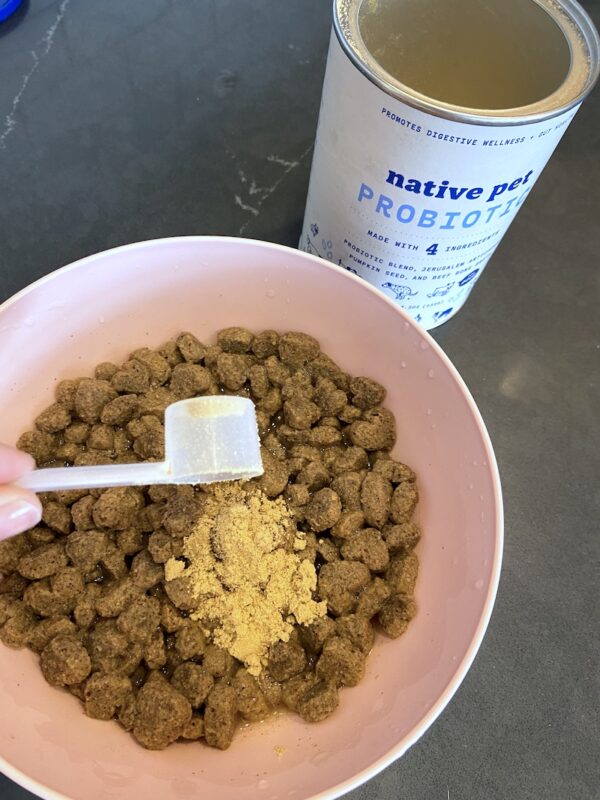
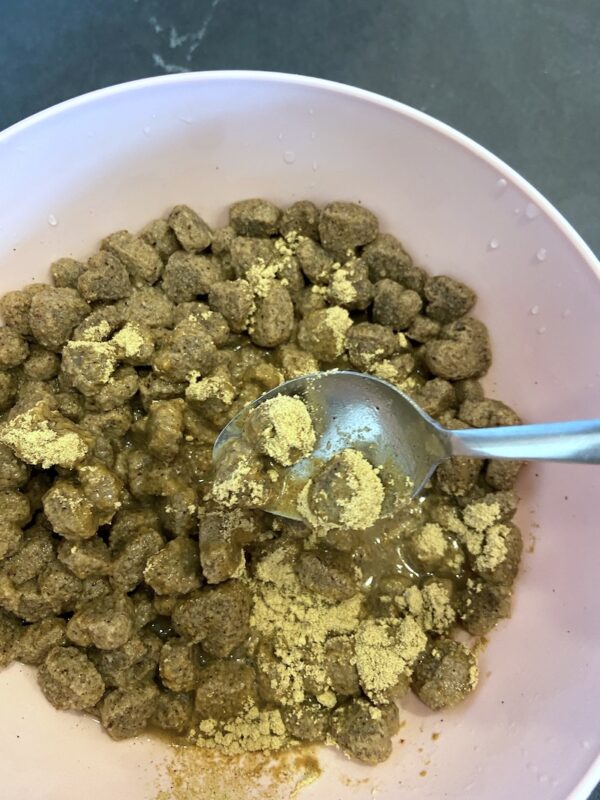
11. Pet Honesty Probiotic Chews
About: Pet Honesty is a probiotic powerhouse of a chew, containing a whopping seven bacterial strains. Also loaded with prebiotics and fiber, it’ll help restore your dog’s digestion, leading to better bathroom breaks.
A natural soft chew containing 7 strains and flavored with duck or pumpkin.
Features:
- Each serving contains 6 billion CFU
- Contains no corn, soy, wheat, or artificial flavoring
- Offered in duck and pumpkin flavors
- Made in the USA
Strains of Probiotics Included:
- Lactobacillus acidophilus
- Bifidobacterium bifidum
- Lactococcus lactis
- Lactobacillus plantarum
- Lactobacillus brevis
- Lactobacillus fermentum
- Enterococcus faecium
Ingredients List
Oat flour, Palm oil, Spray dried duck digest, Ground flaxseed, Dried Aspergillus oryzae fermentation extract...,
Dried Aspergillus niger fermentation extract, Dried Trichoderma reesei fermentation extract, Dried pineapples-stem, Papaya, Dried ground pumpkin, Dried ground sweet potato, Dried ground carrot, Sunflower lecithin, Microcrystalline cellulose powder, Dried Lactobacillus acidophilus fermentation product, Dried Bifidobacterium bifidum fermentation product, Dried Lactococcus lactis fermentation product, Dried Lactobacillus plantarum fermentation product, Dried Lactobacillus brevis fermentation product, Dried Enterococcus faecium fermentation product, Dried Enterococcus faecium fermentation product, Fructooligosacchride, Coconut glycerin, Sorbic acid, Mixed tocopherols, Rosemary extract
Pros
- The assortment of bacterial strains is great
- Flavor is a clear winner
- Many owners report an improvement in stool consistency and a decrease in gas
Cons
- Some dogs experienced stomach upset
- Some ingredients might cause issues for dogs with food sensitivities
12. FERA Probiotics for Dogs
About: Fera is a veterinarian-formulated probiotic powder that also features prebiotics for a well-rounded approach to digestive regularity. Best of all, it’s dairy, grain, and soy free, making it an excellent choice for dogs with food sensitivities.
A vegan powder containing a diverse blend of probiotic bacterial strains and prebiotics.
Features:
- Each scoop contains 5 billion CFU
- USDA-certified organic
- Safe for dogs and cats
- Made in the USA
Strains of Probiotics Included:
- Lactobacillus acidophilus
- Lactobacillus casei
- Saccharomyces boulardii
- Lactobacillus plantarum
- Bifidobacterium infantis
- Lactobacillus bulgaricus
- Bifidobacterium bifidum
- Bifidobacterium longum
- Enterococcus faecium
- Lactobacillus brevis
- Lactobacillus rhamnosus
- Streptococcus thermophilus
Ingredients List
Organic acacia, Fructooligosaccharides, Organic Inulin, Lactobacillus acidophilus, Lactobacillus casei...,
Saccharomyces boulardii, Lactobacillus plantarum, Bifidobacterium infantis, Lactobacillus bulgaricus, Bifidobacterium bifidum, Bifidobacterium longum, Enterococcus faecium, Lactobacillus brevis, Lactobacillus rhamnosus, Streptococcus thermophilus
Pros
- Owners noted improved canine stools and reduced gas
- The odorless, flavorless powder mixes easily with food
- Provides great value for the price
Cons
- Some dogs had adverse digestive reactions
- Feeding powders can get messy and requires cleanup
13. Doggie Dailies Probiotics for Dogs
About: Doggie Dailies entice even the pickiest of pups with rich flavor and a treat-like texture. Packed with both prebiotics and probiotics, it gives your dog’s digestive system a helping hand, while added fatty acids help nourish his skin and coat, so he looks as good as he feels.
A grain-free soft chew flavored with duck or a pumpkin for maximum palatability.
Features:
- 1 Billion CFU per soft chew
- Safe for all ages and breeds
- Available in duck and pumpkin flavors
- Made in the USA with globally sourced ingredients
Strains of Probiotics Included:
- Lactobacillus acidophilus
- Lactobacillus plantarum
- Lactobacillus brevis
- Lactobacillus fermentum
- Lactococcus lactis
Ingredients List
Lactobacillus Acidophilus, Lactobacillus Plantarum, Lactobacillus Brevis, Lactobacillus Fermentum, Lactobacillus Lactis...,
Pea Flour, Garbanzo Flour, Flaxseed Meal, Lecithin, Duck, Mono-and Diglycerides with Citric Acid (To Help Protect Flavor), Egg Powder, Cod Liver Oil, Salmon Oil, Glycerin, Carrot, Fructooligosaccharide, Mixed Tocopherols, Rosemary Extract, Crystalline Cellulose, Sorbic Acid (Natural Preservative).
Pros
- Flavor gets a paw’s up of approval
- Fish oil provides a nice boost for skin and coat health
- Doggie Dailies offers a money-back guarantee
Cons
- Pea and garbanzo flours might cause issues for dogs with food sensitivities
- The texture doesn’t crumble well
14. Perfect Poop
About: Perfect Poop is a grain, gluten, and GMO-free digestive aid that features prebiotics, probiotics, and enzymes for regularity and wellness. Added roughage from dog-safe, sun-cured grass packs fiber, helping your dog’s stool firm up and pass easier.
A multi-step approach to digestive health with prebiotics, probiotics, and a healthy dose of fiber.
Features:
- Contains 1 Billion CFU per tablespoon
- Comes in textured, palate-pleasing morsels
- Offered in chicken and cheddar cheese flavor
- Made in the USA
Strains of Probiotics Included:
- Bacillus Subtilis
- Bacillus Coagulans
Ingredients List
Sun cured miscanthus grass, Dried pumpkin, Flaxseed, Potato starch, Cane molasses...,
Chicken fat, Bacillus subtilis, Bacillus coagulans, Amylase, Cellulase, Hemicellulase, Lipase, Papain, Bromelain, Inulin, Natural chicken flavor, Mixed tocopherols, Citric acid, Rosemary extract
Pros
- Most owners report an improvement in canine bathroom habits
- Taste scored high marks
- Chunked formula easily mixes in food or functions as a treat
Cons
- Some added ingredients might cause issues with dogs with sensitivities
- The price is a bit high
When Do Dogs Need Probiotics?

Probiotics are a healthy addition to any dog’s diet and are now frequently found in various dog foods. That said, some dogs benefit a great deal from adding probiotics to their diet, as they can potentially solve existing issues or concerns.
Your vet may recommend probiotics for your dog if he:
- Has digestive issues: Restoring balance and fighting bad belly bacteria with probiotics can help correct common doggy digestive woes like noxious gas and diarrhea.
- Recently completed a course of antibiotics: Antibiotics disturb the bacterial balance in your dog’s stomach, sometimes killing off too much good bacteria. Probiotics can help replenish these.
- Recently recovered from an illness: Sickness takes its toll on your dog from head to tail, and giving his digestive system a helping hand with probiotics can help him get back to normal.
- Gets sick frequently: If your pup is under the weather a lot, he may be suffering from hidden tummy troubles that are wearing down his defenses. Probiotics help your dog’s system fight off bad bacterial overgrowth that might be behind some of his issues.
- Dogs who have sensitive stomachs: Unfortunately, some pups just seem to have trouble digesting food, but some of these four-footers with sensitive stomachs respond well to probiotics.
Keeping Canine Cultures Alive and Well With Probiotics
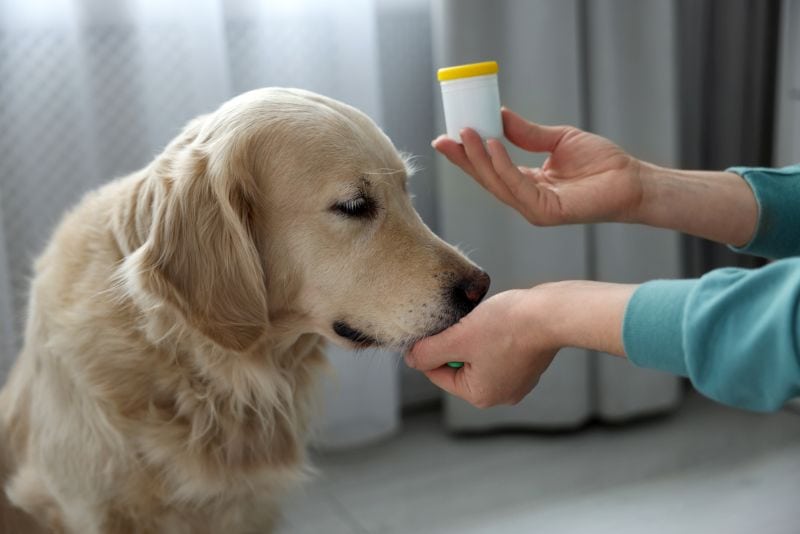
It is important to remember that probiotics are living organisms. Because they have evolved to live inside your dog’s digestive system, they may die when forced to inhabit a jar or box sitting in your cupboard.
If you want your dog to benefit from probiotics, you’ll have to keep them alive.
To some extent, good manufacturers help you accomplish this. They may package the substance in small, single-dose amounts, which prevents you from having to repeatedly expose the billions of bacteria to oxygen, as you would with a large container of the material.
Oxygen will kill these bacteria, as your dog’s gut is an anaerobic, or oxygen-free, environment.
Other manufacturers encapsulate their probiotics in some type of shell, which protects the bacteria from our oxygen-rich atmosphere. Additionally, these shells can also help protect the bacteria from the harsh acids in your pet’s stomach, enabling them to remain viable and intact until they reach the intestines, where they typically set up shop.
High temperatures can also cause the bacteria to die at a rapid rate. Anything above about 100 degrees can cause trouble, so just try to keep your pet’s probiotics in a cool, dry place. Some products are designed to be refrigerated, but we didn’t include any of these on our list.
You should also consult the product label, which should provide some information about the number of bacteria present in the product (typically expressed in CFU, or colony-forming units).
This is helpful, but realize that a significant portion of the sample will be dying over time. Accordingly, it is more helpful to note the guaranteed number of CFU present at the expiration date.
To review, when purchasing dog probiotics, be sure to:
Keep your dog’s probiotics in a cool, dry place.
Don’t open probiotics until you are ready to use them, and consider opting for single-use packaging.
Discard expired products, as they are unlikely to contain a significant number of live CFU.
Try to stick to brands that provide protective shields for their probiotics, so more bacteria reach your pet’s intestines intact.
Opt for brands that explain the number of live CFU at the time the product expires.
Probiotics vs Prebiotics: Which One Does My Dog Need?

Many supplements like prebiotics and probiotics are showing up in dog food today, and sorting out what your dog actually needs can be a headache.
Luckily, breaking down the necessity of prebiotics and probiotics is simpler than most.
To understand the importance of prebiotics and probiotics, you need to visualize their roles in your dog’s digestion. Probiotics are the microorganisms keeping your dog’s digestion balanced, whereas prebiotics are the food the probiotic microorganisms eat.
Think of it like deploying workers to your dog’s digestive system (probiotics) vs. lunch for his system’s existing workers (prebiotics).
Ideally, your dog should receive both prebiotics and probiotics to keep his system running smoothly, which is why you’ll frequently find them together in probiotic supplements.
Some dogs receive enough prebiotics through their diet, so added ones aren’t necessary, but there’s no harm if they happen to be in your chosen probiotic supplement.
What Are the Different Types of Probiotics for Dogs
Probiotics aren’t all alike. In fact, probiotic products come in several different forms. None are inherently better than the others, so you’ll just need to consider the needs of your furry friend and pick the best one you can (don’t worry — you can always try another one in the future if your first one doesn’t work).
A few of the major types of probiotics for dogs include:
- Probiotic Treats: Often marketed as probiotic chews, probiotic treats are exactly what you’d think they are — tasty little edibles fortified with one or more bacteria strains. Though they’re often formulated with tasty natural flavors, these are usually the best option for dogs who aren’t picky eaters.
- Probiotic Liquids: Typically the easiest probiotic supplement to administer (aside from treats, which are very easy to feed to eager eaters), liquid probiotic supplements may also bear natural flavors, but the quantities involved are usually small. This makes them pretty easy for doggo dosing.
- Probiotic Powders: A great option for pet parents who want complete control of the daily dose of bacteria, probiotic powders are typically designed to be mixed in with your dog’s favorite food. Powders don’t always taste great, but they mix well with wet foods and dog food toppers.
- Probiotic Capsules: Designed to be swallowed like a pill, probiotic capsules are another option, but they can be tricky to administer. Pet parents will typically find them easiest to offer via a pill pocket or some other small, tasty morsel (such as a bit of cheese).
Don’t Forget to Keep Your Vet in the Loop!
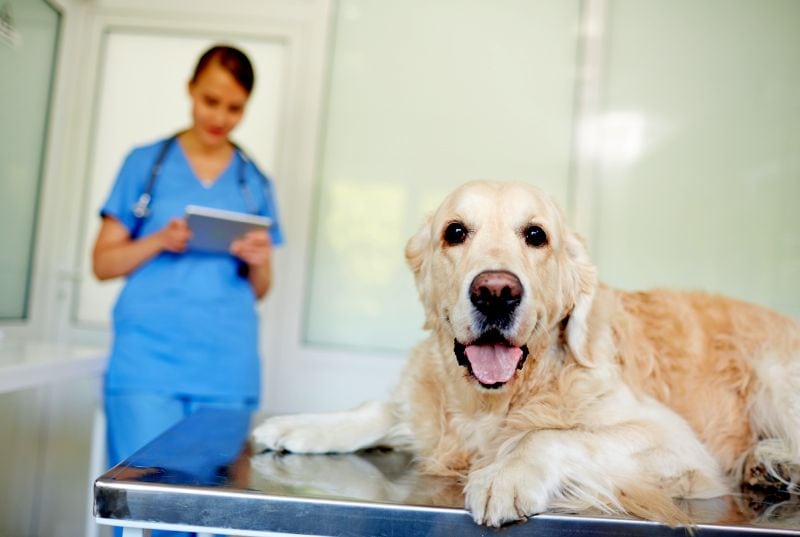
While probiotics are largely considered safe for healthy dogs, you always want to discuss their use with your vet first.
This will not only help ensure you don’t make any of your dog’s existing stomach discomfort or digestive difficulties worse, it’ll also help you with things like dosage. For example, your vet can help you decide things like how many chews per day your dog should have.
Your vet can also help you determine which types of bacteria will be most helpful for your dog’s stomach and bowel health.
Probiotics for Dogs FAQ: Your Dog Probiotic Questions Answered!
Lots of owners have questions about the use of probiotics for dogs. We’ve covered many of them above, but we’ll try to make sure we answer all of your questions below!
Can dogs take human probiotics?
Generally speaking, you’ll want to avoid giving your dog human probiotics. Probiotic supplements designed for humans often have different bacterial strains than those designed for canines, and some contain ingredients that are dangerous for dogs.
What are the health benefits of probiotics for dogs?
There are several health benefits probiotics may offer dogs, but two of the most noteworthy include improved digestive function and healthier bowel movements. This is why it’s common to find probiotics in dog foods designed for dogs with gas.
Can probiotics for dogs help with food allergies?
No. Food allergies are caused by your dog’s overreaction to the proteins in his food, rather than digestive problems.
Is a daily probiotic necessary for dogs?
Many dogs will enjoy health benefits after beginning a probiotic regimen, but that doesn’t mean they are necessary for all dogs.
How many strains of bacteria should a probiotic for dogs have?
This is a difficult question to answer and authorities disagree about the best approach. Some believe that probiotics with a litany of bacterial strains are the most useful, while others feel that multiple probiotic bacteria strains may compete with each other, reducing their overall efficacy. Just speak to your vet about the issue to decide which approach is right for your dog.
How often should you give your dog a probiotic?
This is a question you should ask your veterinarian, as all dogs have different supplementation needs. That being said, most probiotics for dogs are intended to be administered on a daily basis by the manufacturer.
***
Now it’s your turn, pet parents!
Did we miss something? Do you have any other questions about probiotics for dogs? Have you ever put your furry friend through a course of probiotics?
Perhaps you use them as a regular, long-term supplement. If so, we’d love to hear about your experiences in the comments below!

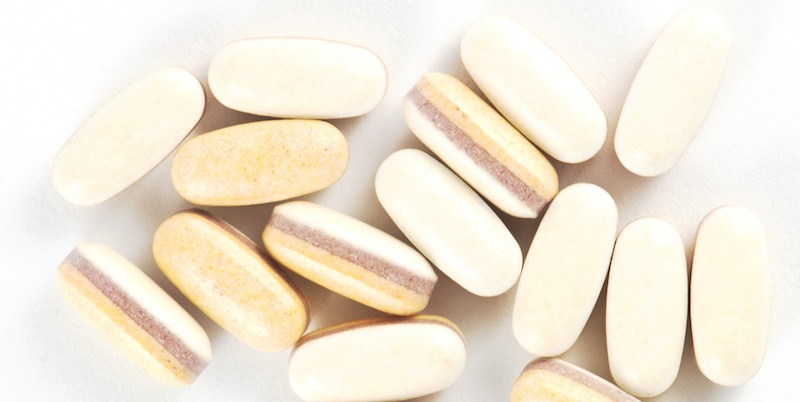

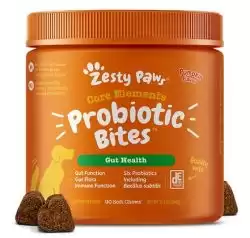
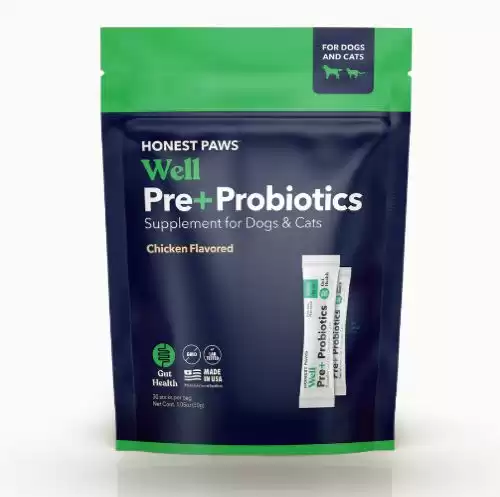
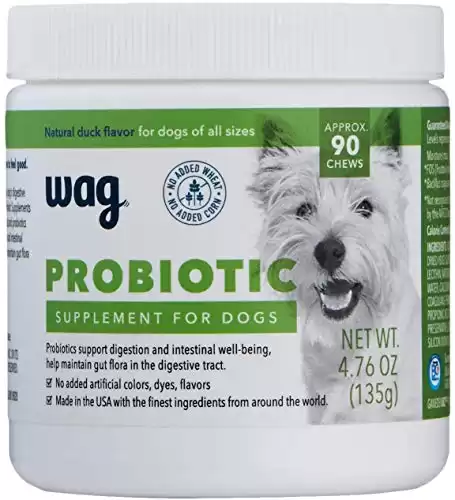
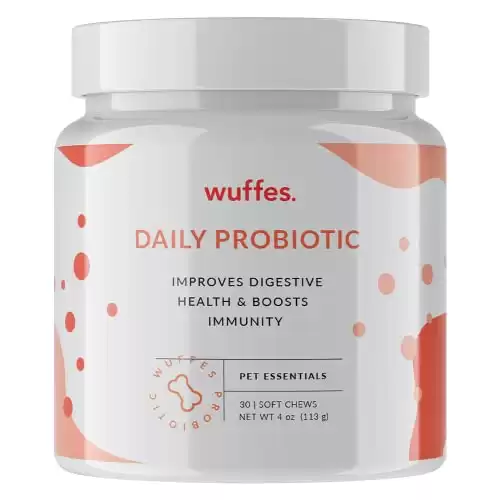
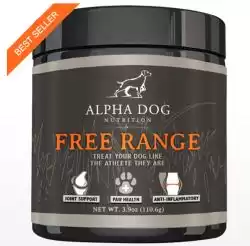
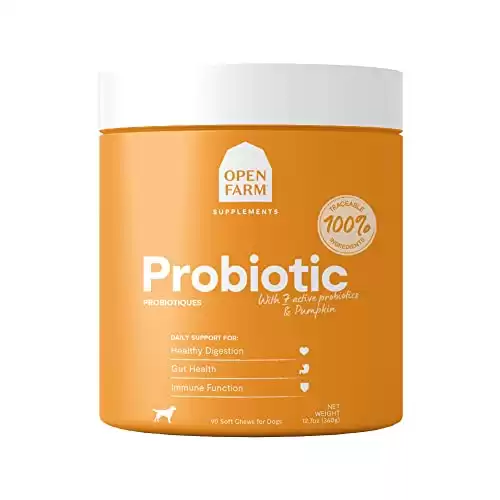
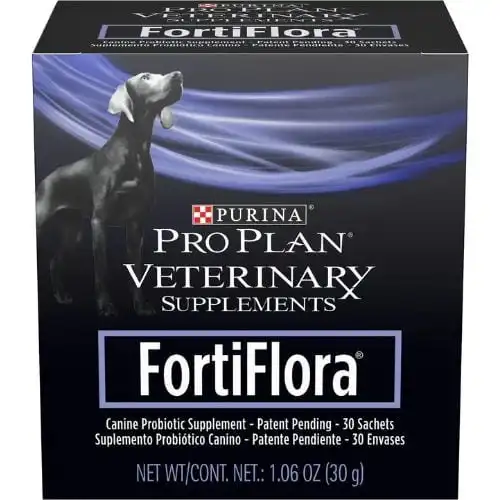
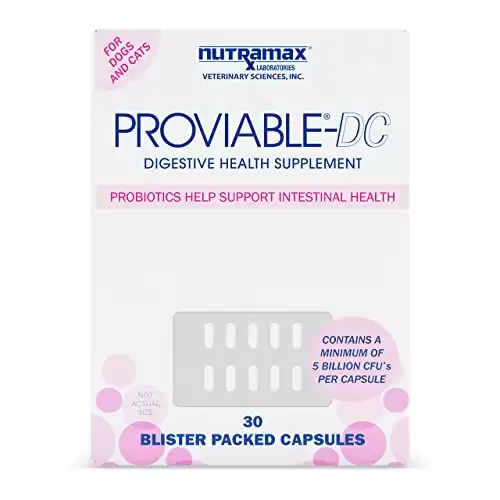
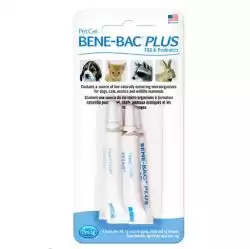
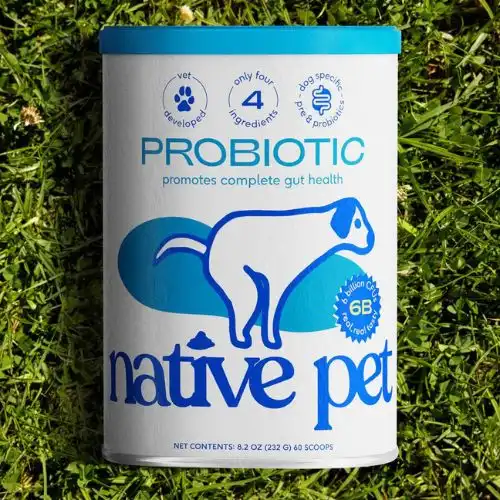
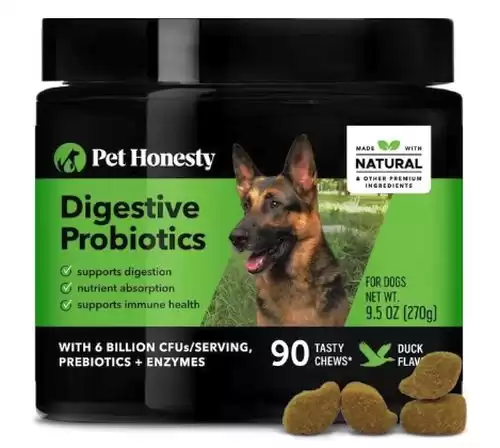
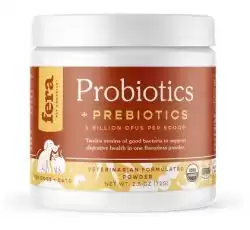
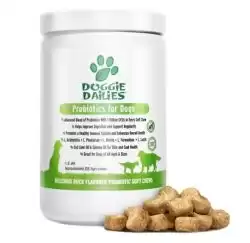
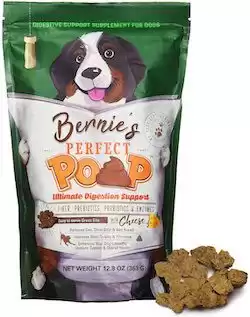

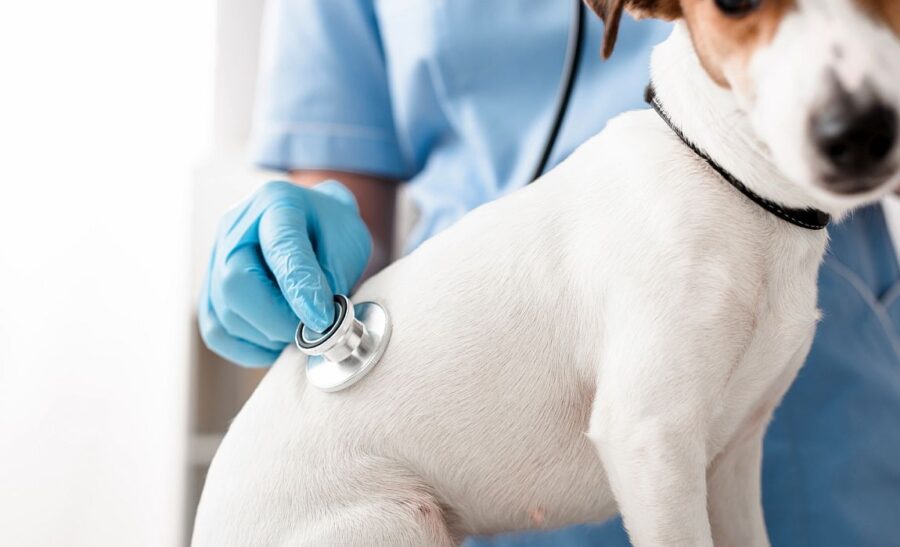





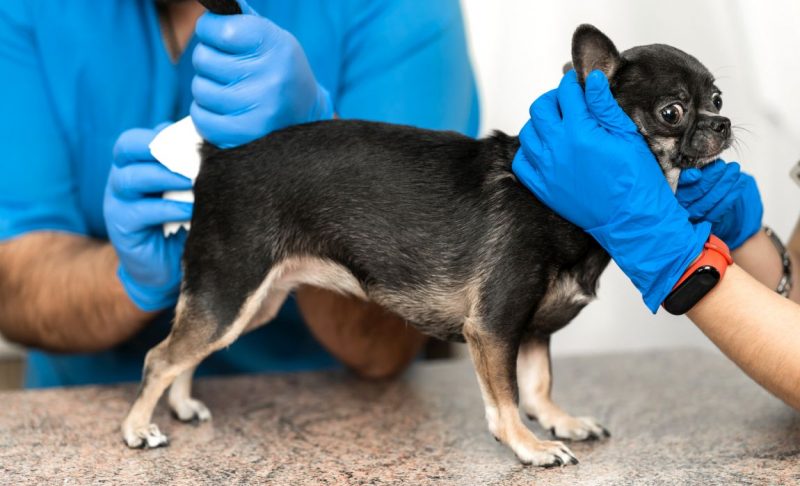
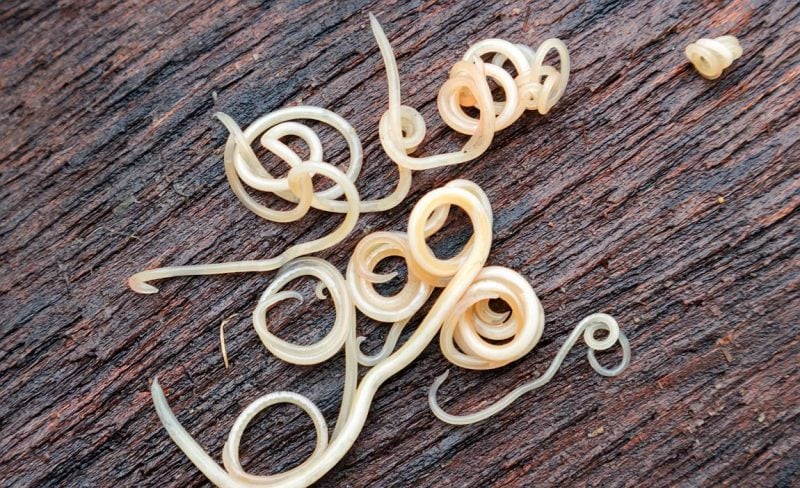


Leave a Comment